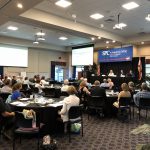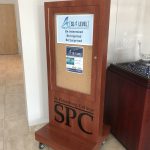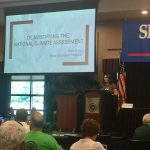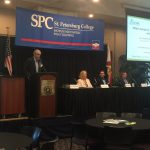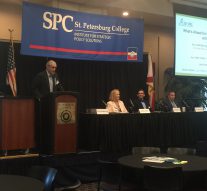
[Sea Level] Rise Up: Realities & Opportunities
SPC Programs & Events April 16, 2019By Micah Prewitt
On Saturday April 6th, 2019, a conference about the recent Fourth National Climate Assessment by the National Oceanic and Atmospheric Administration (NOAA), and continued global warming and sea level rise, took place at Saint Petersburg College’s Seminole Campus. Two panels of experts presented their opinions on the impact of rising sea levels and strategies to educate the community. Real estate values, property insurance, mortgages and how individuals can become civically engaged in the climate conversation were discussed. David Klement, Executive Director of the Institute for Strategic Policy Solutions at Saint Petersburg College, gave the introduction to the event.
Mary Burke, Science Policy Coordinator of the Tampa Bay Estuary Program, discussed the relationship between scientific literacy and civic engagement. She began by explaining how to identify and disregard misinformation. Then, she explained how citizens can access the Fourth National Climate Assessment and gave a basic overview of the report’s findings. “Global warming will continue, and the sea level will continue to rise” she said. She presented the government’s Climate Science Special Report (CSSR), a once every four-year report on current climate trends, as a reliable source.
The first panel followed Burke’s brief summary of the CSSR’s Fourth National Climate Assessment. The panel discussed rising sea levels as they relate to property values, property insurance, and mortgages. The panel consisted of Denise Drews, Loan Officer, Paramount Residential Mortgage Group, Jake Holehouse, H.H. Insurance, and The Honorable Mike Twitty, Pinellas County Property Appraiser. The panel was moderated by The Honorable Bob Minning, former mayor of Treasure Island, and Suncoast Sea Level Rise Collaborative Co-chair.
The panel discussed that rising sea levels will inevitably effect the value of property in federally identified flood zones, and the likely consequences. Ms. Drews reported the mortgage industry is not prepared. She explained that if prospective purchasers of a property in a flood zone have the ability to pay a mortgage, the law requires that the money be loaned to them. The mortgage industry will likely experience sharp increases in foreclosure rates on properties as insurance rates rise due to the rise in sea level. Many property owners will no longer be able to pay the increased insurance costs. She reiterated that the mortgage industry is unprepared.
Mr. Holehouse briefed that insurance for properties in flood zones currently decrease the value of residential homes by 7 percent. He related that homeowner’s property insurance rates could begin to rise as fast as 15 percent per year as the rise in sea level becomes more evident. The impact on the approximately 210,000 residential homes in Pinellas County flood zones will likely create a financial crisis.
Mr. Twitty told the audience that 45 percent of Pinellas County’s tax base live in flood zones. Flood zones A and B are the most vulnerable. Currently ad valorem tax rates (property value + millage rate) do not fully take into account the businesses and homeowners who choose to live in flood zones. In other words, property taxes are generally driven by the market and not the fact a property is located in a flood zone when doing property tax calculations. The question of whether or not those who live in flood zones should be taxed at the same rate as those who do not live in areas prone to flooding was examined. This question remains unanswered.
The second panel was focused on using constituent pressure to enact climate policy. The panel consisted of Whitney Fung, a University of South Florida Ph.D. Student and member of Physicians for Social Responsibility Florida (PSRFlorida), The Honorable Bill Johnson, former Clearwater City Councilmember, Representative Jennifer Webb, Florida House of Representatives, and Lisa Vanover, League of Women’s Voters. The panel was moderated by Rob Lorei, host of Florida This Week, WEDU, and News and Public Affairs Director, WMNF.
Representative Jennifer Webb stressed the importance of using constituent pressure to enact climate policy. “If you can, get an appointment with a representative. It’s the most effective way to influence climate policy” Webb said. With the Florida legislature just beginning to talk about climate change, the panel explained that civic involvement is important in motivating elected officials to take action and prioritize climate policy.
Ms. Fung suggested productive communication methods for conveying the climate change message in order to mobilize citizens to action. Mr. Johnson related strategies for obtaining appointments with local governmental elected officials.
The Honorable Bob Minning facilitated the conclusion. “We are uncertain of the future consequences of global warming and sea level rise, but we are certain it is happening and will continue to happen. As a citizen, the best thing you can do to take action is raise awareness with your peers and communicate with your elected officials.” The event concluded with a question and answer period.


